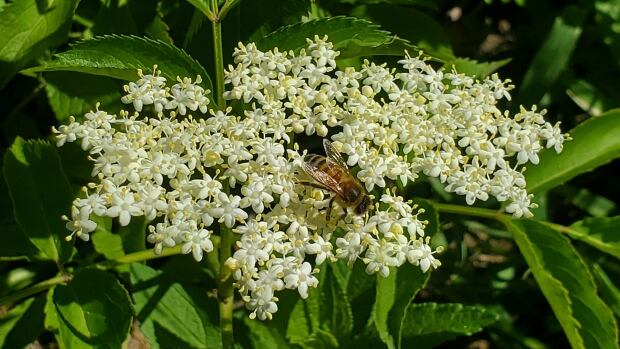
Bee conservation project has Métis Nation of Alberta members abuzz
CBC
A bee conservation project by the Métis Nation of Alberta (MNA) has members buzzing with excitement over protecting pollinators.
Jennifer Pylypiw, MNA's environment and climate change engagement and policy manager, said when the Native Bee Conservation Program was launched last year, the response from members was "crazy."
"We originally launched it with just 200 [kits] as we didn't know how it would be received, and they were all claimed in 30 minutes," she said.
Due to the overwhelming interest last year, the MNA created 500 kits this year. Once again, interest surged and about 1,000 people entered a draw to win one.
Each kit comes with a bee hotel — a wooden box with straws and drilled holes where bees can tunnel in and make their nests — and wildflower seeds.
The hotels are supplied by the Edmonton and Area Land Trust which has also provided the MNA with conservation information.
The massive interest in the project comes from a deep appreciation and knowledge of the land among Métis people, Pylypiw said.
"Our citizens care so deeply about their land and they're so aware of the connection between the pollinators, between the food they eat, between the spaces they enjoy," she said.
While much attention has been given to the challenges facing honeybees, the MNA's program intends to protect the roughly 300 native bee species in Alberta, some of which are listed as vulnerable.
"So not honeybees, which are actually a species introduced from Europe," Pylypiw said.
"They're like the little tiny ones that you see as well as bumblebees and things like that."
The province's native bee populations are at risk for a wide variety of reasons including herbicides, monoculture farming, climate change and habitat loss, she added.
For MNA member Kyla Ferris, who took part in the program last year, the bee hotel was a hit at her after school daycare in Spruce Grove, Alta., 30 kilometres west of Edmonton.
Ferris noticed trees being cut down in her neighbourhood and joined the program because she wanted to help bring back pollinators. It also ended up being a great teaching tool for the kids.





















 Run 3 Space | Play Space Running Game
Run 3 Space | Play Space Running Game Traffic Jam 3D | Online Racing Game
Traffic Jam 3D | Online Racing Game Duck Hunt | Play Old Classic Game
Duck Hunt | Play Old Classic Game